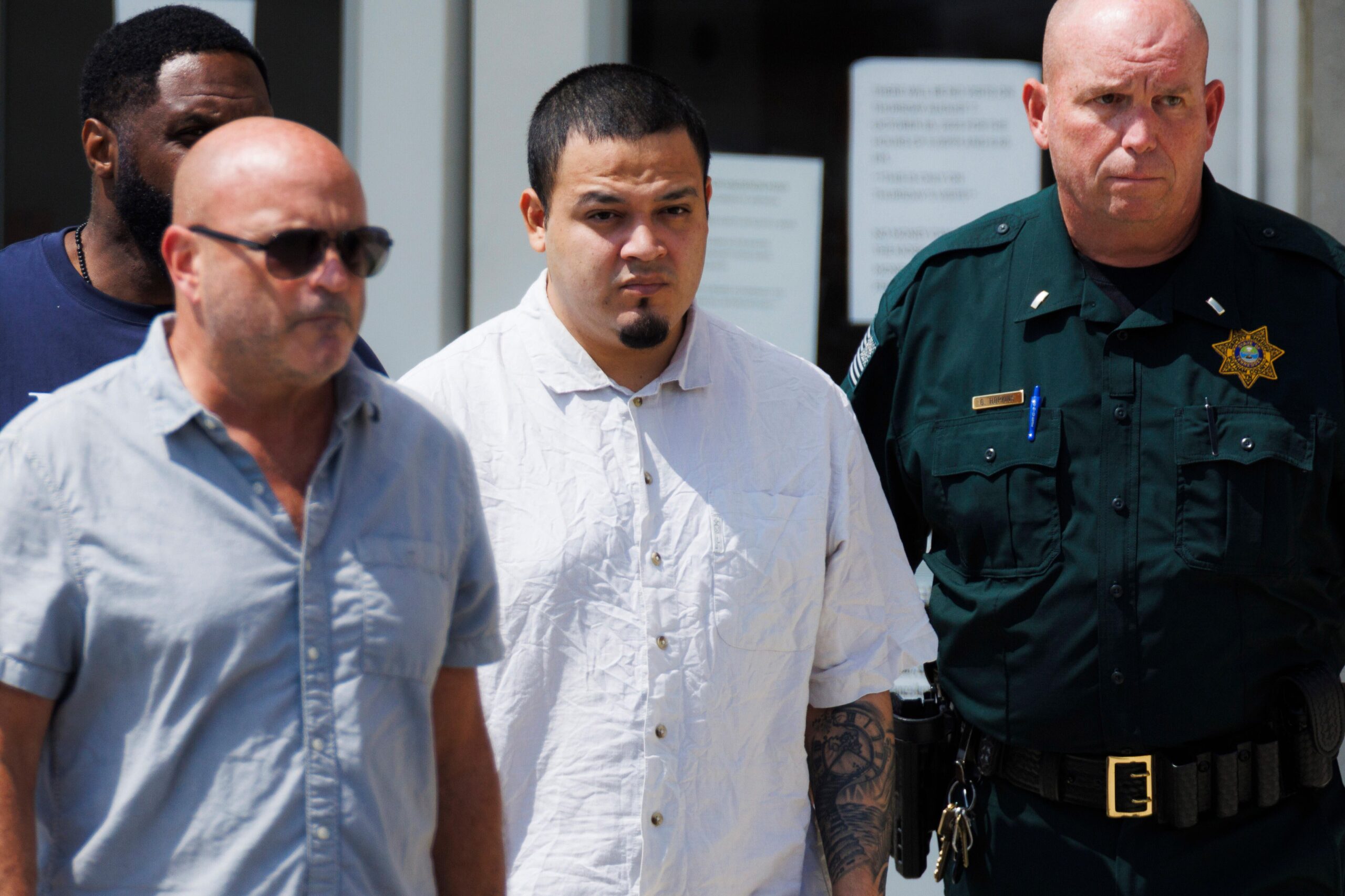A day after his release from a Tennessee jail, court filings revealed on Saturday that the Trump administration intends to deport Kilmar Abrego Garcia to Uganda after he rejected a deal to be sent to Costa Rica if he entered a guilty plea to charges of people smuggling.
Since his erroneous deportation in March, his case has garnered attention amid President Donald Trump’s immigration enforcement. The Trump administration detained him on people smuggling charges after bringing him back to the United States in June in response to a court order.
Suggested Videos
His lawyers, who are arguing that the cases against him should be dropped, revealed the possibility of his deportation to Uganda in court files on Saturday.
According to the documents, the administration has asked him to show up at an immigration facility in Baltimore on Monday so that he can be deported once more.
The court filings were filed the day after Abrego Garcia was freed from a Tennessee jail. He claimed to have seen his family for the first time in over five months in a statement released late Friday.
“Justice has not been fully served, but we are getting closer to it,” he continued.
The administration will not give up until this Salvadoran man is brought to justice and removed from our nation, said Homeland Security Secretary Kristi Noem, who criticized the decision to free Abrego Garcia.
When asked if ICE would try to detain him or transport him to a nation other than El Salvador, she did not answer.
There are two distinct accounts of Abrego Garcia, depending on who is narrating his story.
He was portrayed by Trump and his administration as an MS-13 gang member and a persistent national migrant smuggler. According to Abrego Garcia’s lawyers, he was a construction worker and family man who was unilaterally deported and then falsely accused in order to preserve his political reputation.
Here’s what to know as Abrego Garcia’s narrative continues to take a new turn:
The Uganda-Costa Rica deal
Administration officials said late Thursday that if Abrego Garcia entered a guilty plea to charges of people smuggling, he might be deported to Costa Rica, where he would not be subject to detention and may be regarded as a lawful immigrant.
Officials threatened to deport him to Uganda if he refused.
His lawyers were informed by the Department of Homeland Security that he must appear before immigration officials in Baltimore on Monday in order to be deported.
A deal has been reached by Uganda to allow the deportation of certain migrants from the United States.
Regarding whether the plea deal had been properly withdrawn, his lawyers remained silent. Abrego Garcia had rejected a portion of the offer to stay in jail, according to the brief they submitted, and his lawyers would inform Mr. Abrego of the government’s request.
Abrego Garcia’s anxiety of returning to El Salvador was well-founded.
According to court documents, 30-year-old Abrego Garcia departed El Salvador at the age of 16 when his family was intimidated and extorted by a local gang. He was not permitted to remain in Maryland, where his brother resides as a U.S. citizen.
Abrego Garcia met Jennifer Vasquez Sura, his future wife, while working in construction. After she became pregnant with his child in 2018, he moved in with her and her two kids. They resided just outside of Washington in Prince George’s County.
According to court documents, Abrego Garcia and three other men were arrested by local police in March 2019 after they went to a Home Depot in search of work as laborers. Their clothes and tattoos raised suspicions that they were members of MS-13.
According to court documents, a criminal informant informed police that Abrego Garcia was in MS-13; nevertheless, police chose not to arrest him and instead turned him over to ICE.
More than a year after his arrival, Abrego Garcia’s subsequent asylum claim was refused by a U.S. immigration judge. However, according to court documents, the judge decided that he had a legitimate fear of gang persecution in El Salvador and granted him protection from deportation.
Following his release, Abrego Garcia was placed under federal control. According to his attorneys, he was granted a federal work permit and made an annual check-in with ICE. He worked full-time as an apprentice in sheet metal and joined a union.
The gall to retaliate
The Trump administration declared MS-13 to be a foreign terrorist group in February. In violation of the 2019 ruling from the U.S. immigration judge, it deported Abrego Garcia to the prison in El Salvador in March.
Later, Abrego Garcia stated in court filings that he had been subjected to physical and psychological abuse, but El Salvador President Nayib Bukele refuted the claims.
Its breach of the 2019 immigration judge’s decision was characterized by the Trump administration as an administrative blunder. Additionally, Trump and other authorities reaffirmed their allegations that Abrego Garcia was a member of MS-13.
In an attempt to reunite with her husband, Vasquez Sura sued. In early June, the Trump administration brought Abrego Garcia back to the United States after a Supreme Court order and growing political pressure. However, it was to deal with the accusations of human smuggling.
Abrego Garcia was driving a car with nine passengers when he was stopped for speeding in 2022, which is the basis for the smuggling case. Although he was suspected of people smuggling by Tennessee police, he was not charged and was let to continue driving.
Abrego Garcia entered a not guilty plea to the June smuggling allegations. According to pre-trial testimony, the case depends on the testimony of cooperating witnesses, some of whom have asked for or received assistance with criminal and immigration concerns.
On Tuesday, Abrego Garcia’s attorneys submitted a seldom used move to dismiss the case on the grounds of selective and vindictive prosecution.
According to his attorneys, this case is the product of the government’s deliberate attempt to punish him for having the gall to retaliate.
The court must hear the government’s response by Tuesday.
Fears of deportation are realized
In June, Nashville U.S. Magistrate Barbara Holmes decided that Abrego Garcia is not a flight risk or a community danger and that he should be freed from custody pending trial.
However, Abrego Garcia was held in a Tennessee jail for approximately 11 weeks at the request of his lawyers because they were concerned that ICE would try to deport him right away. In a federal court in Maryland, where Abrego Garcia’s wife is suing the Trump administration, those concerns were validated.
In July, ICE associate director Thomas Giles stated in court that Abrego Garcia will be placed under arrest as soon as he was released. The Trump administration hasn’t made a decision yet, he continued, but South Sudan or Mexico might be open to taking Abrego Garcia.
Because Abrego Garcia entered the country unlawfully and because a U.S. immigration judge declared him eligible for removal in 2019, U.S. officials have maintained that he can be deported—just not to his home country of El Salvador.
The judge offers several safeguards.
U.S. District Judge Paula Xinis barred ICE from holding Abrego Garcia in Tennessee immediately after his release, citing fears that he would be deported without due process.
In late July, Xinis, who is presiding over the Maryland action, issued an order restricting ICE. Any removal processes had to start in Baltimore, she insisted. “When the Trump administration wrongfully deported Abrego Garcia to El Salvador, that’s where they should have started,” Xinis wrote.
Additionally, Xinis mandated that ICE give three working days’ notice before beginning removal procedures. Abrego Garcia and his lawyers will have the chance to voice any legitimate concerns about torture or persecution in the nation where ICE intends to deport him during that period.
According to Xinis, the Trump administration has not done anything to reassure the Court that Abrego Garcia’s rights to due process will be upheld in the absence of intervention.
According to Xinis, ICE would need to restart his 2019 case before an immigration judge in order to send him back to El Salvador. And proper notice and a hearing would be necessary for that.
Abrego Garcia might be required to appear in Baltimore for immigration procedures, which might involve a valid arrest, imprisonment, and eventual removal, according to Xinis.
Last month, Xinis stated, “This Court will have nothing further to say so long as such actions are taken within the bounds of the Constitution and applicable statutes.”
Home detention and electronic monitoring
Abrego Garcia’s lawyers petitioned the federal judge in Tennessee to free him in the weeks after Xinis’s order.
Her release was ordered Friday by Nashville U.S. magistrate Holmes. Abrego Garcia must remain in Maryland with his brother and be under home confinement and electronic surveillance.
He was directed by the judge to go straight to Maryland. Although Holmes mentioned in her order that U.S. Marshals would arrange the trip, Abrego Garcia’s attorneys said in a court filing on Tuesday that a private security company would transport him.
Holmes mandated that Abrego Garcia have access to his lawyers in order to get ready for the human smuggling trial if he is placed in ICE custody.
Late January is the date of the trial.
___








